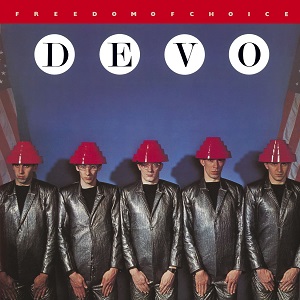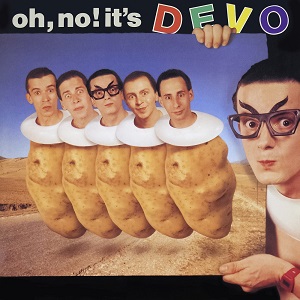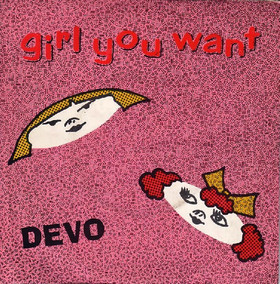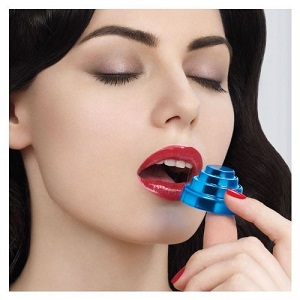
Devo is an American new wave band from Akron, Ohio, formed in 1973. Their classic line-up consisted of two sets of brothers, the Mothersbaughs and the Casales, along with Alan Myers. The band had a No. 14 Billboard chart hit in 1980 with the single "Whip It", the song that gave the band mainstream popularity.

Mark Allen Mothersbaugh is an American musician and composer. He came to prominence in the late 1970s as co-founder, lead singer and keyboardist of the new wave band Devo, whose "Whip It" was a top 20 single in the US in 1980, peaking at No. 14, and which has since maintained a cult following. Mothersbaugh was one of the primary composers of Devo's music.

Freedom of Choice is the third studio album by the American new wave band Devo, released in May 1980 on Warner Bros. Records. The album contained their biggest hit, "Whip It", which hit No. 8 and No. 14 on the Billboard Club Play Singles and Pop Singles charts, respectively. Freedom of Choice peaked at No. 22 on the Billboard Pop Albums chart.

Polysics is a Japanese techno/electronic band from Tokyo, who dubs its unique style as "technicolor pogo punk". It was named after a brand of synthesizer, the Korg Polysix. The band started in 1997, but got their big break in 1998 at a concert in Tokyo. They create high energy music, fusing conventional guitar music with synthesized and computer generated sound to create a unique mixture of punk and synthpop heavily inspired by the American bands Devo and The Tubes, as well as Japanese bands such as P-Model and Yellow Magic Orchestra. Their song lyrics often consist of Japanese, English, or just downright gibberish. The band has been noted for their extremely energetic live performances and their wild gimmicky outfits, notably their straight-bar sunglasses and trademark orange boiler suits stamped with a simple "P".

Oh, No! It's Devo is the fifth studio album by American new wave band Devo, released in 1982 by Warner Bros. Records. The album was recorded over a period of four months, between May and September 1982, at Cherokee Studios in Hollywood, Los Angeles, and was produced by Roy Thomas Baker.

"Whip It" is a song by American new wave band Devo from their third studio album Freedom of Choice (1980). It is a new wave and synth-pop song that features a synthesizer, electric guitar, bass guitar, and drums in its instrumentation. The apparently nonsensical lyrics have a common theme revolving around the ability to deal with one's problems by "whipping it". Co-written by bassist Gerald Casale and lead vocalist Mark Mothersbaugh, Devo recorded "Whip It" with producer Robert Margouleff at the Record Plant in Los Angeles.

An energy dome is a hat often worn by the American new wave band Devo as part of the members' stage outfits. The dome was first worn during the band's Freedom of Choice campaign of 1980. It reappeared in the 1982, 1988, and 1990 tours, as well as most performances since 1997. The domes were custom made for the band from vacuum formed plastic, in a distinctive round, ziggurat shape, and are occasionally—and incorrectly—referred to as "power domes" or "flowerpots". The shape is also reminiscent of the Waldviertel Pyramid. When asked about the story behind the hats, Mark Mothersbaugh recounted:
We designed them, Jerry [Casale] and I. We were influenced both by German Bauhaus movement and geometric fashion, and Aztec temples. We just liked the look. It looked good, and it didn't look like any other bands out there. We weren't interested in wearing groovy hats or groovy clothing. We kind of looked like Lego toys or something by the time we got those on our heads, and that was a positive thing.

Gerald Vincent Casale is an American musician. He came to prominence in the late 1970s as co-founder, co-lead vocalist and bass player of the new wave band Devo, which released a top 20 hit in 1980 with the single "Whip It". Casale is the main lyricist and one of the primary composers of Devo's music, as well as the director of most of the band's music videos. He is one of only two members who have been with Devo throughout its entire history. Casale's brother Bob also performed with the band.

Q: Are We Not Men? A: We Are Devo! is the debut studio album by the American new wave band Devo. It was originally released in August 1978 on Warner Bros. in the North America and Virgin Records in Europe. Produced by Brian Eno, the album was recorded between October 1977 and February 1978, primarily in Cologne, West Germany.

Duty Now for the Future is the second studio album by American new wave band Devo, released on June 1, 1979, by Warner Bros. Records. Produced by Ken Scott, the album was recorded between September 1978 and early 1979 at Chateau Recorders in Hollywood.

Shout is the sixth studio album by American new wave band Devo, released on October 8, 1984 by Warner Bros. Records.
General Boy is a character created around 1975 by new wave band Devo. He is usually seen portrayed by Robert Mothersbaugh, Sr., the father of Devo's lead singer Mark Mothersbaugh, former drummer Jim Mothersbaugh, and lead guitarist Bob Mothersbaugh.
Devo 2.0 was a pop group quintet, created for Walt Disney Records, of child actors who sing, dance, and mime playing instruments along to songs re-recorded by some of the original members of Devo. Jerry Casale directed all nine of the videos. Actress Jacqueline Emerson, who later appeared in The Hunger Games, was a member. The band split up in 2007 when lead singer Nicole Stoehr and lead guitarist Nathan Norman quit.

"Dare to Be Stupid" is an original song by "Weird Al" Yankovic. It is a musical pastiche of the band Devo. Released as the flipside to "The Touch", the song was included in the soundtrack for The Transformers: The Movie and is his most popular original song.

"Evolution" is a song by American nu metal band Korn. The song was the first single to be released from the band's untitled album on June 12, 2007. It is one of the four tracks in which Brooks Wackerman of Bad Religion performed drumming duties.

"Girl U Want" is a 1980 single by American new wave band Devo. It was the first single released from their third studio album, Freedom of Choice (1980).

"Watch Us Work It" is a single by the US new wave band Devo, produced by Teddybears. It was originally released on July 27, 2007, and was featured in a commercial for Dell. It was subsequently re-released, on vinyl, in December 2008. The song was included on the deluxe version of the band's ninth studio album Something for Everybody, which was released on June 15, 2010. The song features a sample drum track from "The Super Thing" from Devo's 1981 album New Traditionalists.

Something for Everybody is the ninth studio album by American new wave band Devo. It was originally released in June 2010 on their original label Warner Bros., and it was their first issued on that label since their sixth studio album Shout in 1984. The album was recorded between July 2007 and mid-2009, at Mutato Muzika, in West Hollywood, California. The album is the last Devo album to feature Bob Casale, who died in February 2014.
David Kendrick is an American musician who is currently a member of the experimental pop band Xiu Xiu. A former member of Gleaming Spires and Devo, he has recorded and toured with Sparks, Andy Prieboy and Revolushn. He is based in Los Angeles, California.















